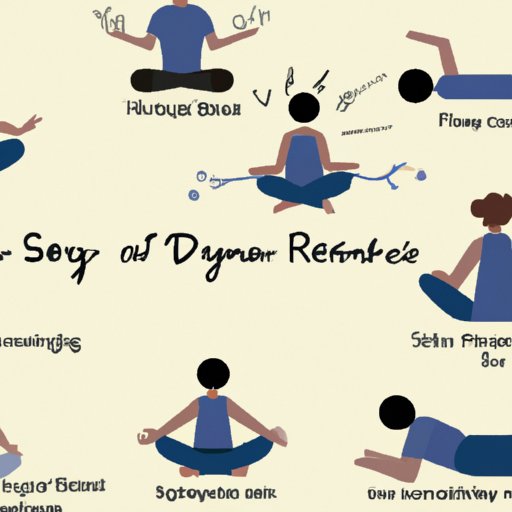Introduction
Anxiety is a normal emotion that everyone experiences from time to time. It is a natural response to stressful situations or events, and can be beneficial in helping us prepare for challenging tasks. However, when it becomes excessive, persistent, and overwhelming, it can interfere with daily activities and lead to significant distress. For many people, yoga can be an effective tool to help manage anxiety levels.
Yoga is an ancient practice that combines physical postures, breathing exercises, and meditation. It has been used for centuries to promote physical and mental wellbeing, and is becoming increasingly popular in the West. The practice focuses on connecting the body and breath, and cultivating mindfulness and awareness.

Analyzing the Effects of Yoga on Anxiety Levels
There are numerous physiological and psychological benefits associated with yoga. Physiologically, regular practice of yoga can help reduce heart rate and blood pressure, increase flexibility and strength, and improve respiration. Psychologically, yoga can help reduce stress levels, improve concentration and focus, and increase feelings of relaxation and contentment.

Exploring How Yoga Can Help Manage Anxiety Symptoms
The physical and mental benefits of yoga can be particularly useful for those struggling with anxiety. Relaxation techniques such as deep breathing, stretching, and progressive muscle relaxation can help reduce tension and calm the mind. By focusing on the breath and body awareness, one can learn to observe thoughts without judging them, and to stay present in the moment rather than worrying about the past or future.
Guided imagery and meditation can also be helpful in calming the mind and reducing anxiety. Imagery involves focusing on positive images or scenarios to help bring about a sense of relaxation and balance. Meditation can help to cultivate mindfulness and acceptance, and to gain insight into our thoughts and feelings.
Examining the Benefits of Yoga for Anxiety Relief
Regular practice of yoga can have numerous benefits for managing anxiety symptoms. Studies have found that yoga can help improve mood and self-esteem, and reduce stress levels. Physical activity, such as yoga, can also be beneficial for improving sleep quality, which is often disrupted by anxiety.

Investigating the Role of Yoga in Reducing Stress and Anxiety
Mindfulness and awareness are key components of yoga, and can be beneficial for reducing stress and anxiety. By acknowledging emotions and thoughts without judgement, we can learn to accept them and let go of any negative attachments. This can help us to better understand why we feel anxious and how to manage it more effectively.

Understanding the Link Between Yoga and Anxiety Management
The connection between physical and mental health is well established, and yoga can be an effective way to strengthen this link. By engaging both the body and mind in a single practice, we can become more aware of how our physical sensations influence our emotional state. This can help us to better manage our anxiety, as well as improve our overall health and wellbeing.
Comparing Different Types of Yoga to Treat Anxiety
Different types of yoga can be used to treat anxiety. Hatha yoga is a gentle form of yoga that focuses on alignment and movement. Kundalini yoga is a more vigorous practice that incorporates chanting and meditation. Vinyasa yoga is a dynamic form of yoga that links breath and movement. All three styles can be used to reduce stress and anxiety levels.
Reviewing Clinical Studies on the Impact of Yoga on Anxiety
Several clinical studies have been conducted to assess the impact of yoga on anxiety. A systematic review of 42 studies found that yoga was associated with significant reductions in anxiety symptoms. The findings suggest that yoga may be a useful tool for managing anxiety, although further research is needed to confirm these results.
Limitations of existing studies include small sample sizes and lack of control groups. Additionally, it is difficult to determine whether the effects of yoga on anxiety are due to the physical or psychological components of the practice. Further studies are needed to explore these issues.
Implications of the findings include the potential for yoga to be used as an additional or alternative treatment for anxiety. Given the low cost and accessibility of yoga, it may be an appealing option for those seeking relief from anxiety symptoms.
Conclusion
This article explored the potential benefits of yoga for managing symptoms of anxiety. It looked at how yoga can help reduce stress levels, improve mood and self-esteem, and strengthen the mind-body connection. Clinical studies were also reviewed to assess the impact of yoga on anxiety. The findings suggest that yoga may be a useful tool for managing anxiety, although further research is needed to confirm these results.
In conclusion, yoga can be a beneficial tool for managing anxiety levels. By incorporating relaxation techniques, mindful awareness, and physical activity, yoga can help reduce stress, improve mood, and promote overall wellbeing. For those seeking relief from anxiety symptoms, yoga may be an appealing option.


